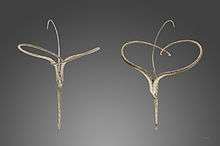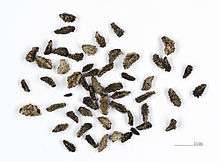Proboscidea althaeifolia
| Proboscidea althaeifolia | |
|---|---|
 | |
| Two views of the same capsule of P. althaeifolia | |
| Scientific classification | |
| Kingdom: | Plantae |
| (unranked): | Angiosperms |
| (unranked): | Eudicots |
| (unranked): | Asterids |
| Order: | Lamiales |
| Family: | Martyniaceae |
| Genus: | Proboscidea |
| Species: | P. althaeifolia |
| Binomial name | |
| Proboscidea althaeifolia (Benth.) Decne. | |

Proboscidea althaeifolia is a species of flowering plant in the family Martyniaceae known by the common names desert unicorn-plant[1] and yellow-flowered devil's claw. It is native to the desert southwest of the United States, where it grows in sandy habitat and blooms during the hot summer. This is a perennial herb growing from a thick, tuberlike yellow root. The stem is decumbent, creeping along the ground. The shiny leaves have rounded, oval, or roughly triangular blades up to 7 centimeters long which are deeply lobed and wavy along the edges. The inflorescence is an array of many showy, fragrant, bell-shaped flowers with five lobes flaring several centimeters wide. The flower is yellow to orange or apricot with an intricate pattern of speckles and streaks, its lower lobe lined with a nectar guide. The fruit is a large seed pod many centimeters long, a cylindrical body tapering into a very long, thin, curving tail. As the fruit dries the tail cracks open and splits into two hooked, claw-like halves. These hard, dry fruits were used as tools by local Native Americans.[2]
References
- ↑ "Proboscidea althaeifolia". Natural Resources Conservation Service PLANTS Database. USDA. Retrieved 14 October 2015.
- ↑ Ethnobotany